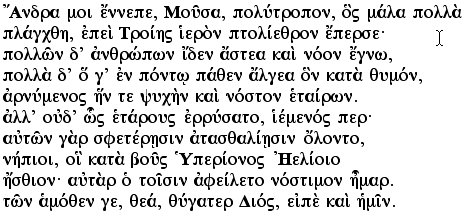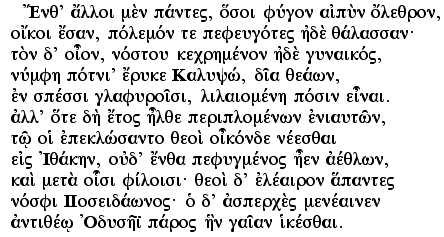odyss110 (click to hear)
1-10 (scroll down for translation)

Translation: Tell me of the man, Muse, the wily one, who was driven far and wide, after he’d sacked the sacred citadel of Troy. Many were the men whose towns he saw and minds he knew; many were the trials he endured in his heart on the sea, contending for his own life and his companions’ return. But he still couldn’t save his companions, try though he did; they were destroyed by their own transgressions, the fools; they devoured the oxen of Hyperion the Sun God. And so he took away the day of their homecoming. From hereabouts, Goddess, Daughter of Zeus, tell us these things as well.
odyss110 (click to hear)
11-21 (scroll down for translation)

Translation: Now all the others, as many as had escaped sheer destruction, were at home, safe from both war and sea; he alone, pining for his return and for his wife, had been detained, by the divine nymph Calypso, bright goddess, in hollow caves, where she longed to have him as husband. But when the year came around, in the revolving of seasons, which the gods had marked out for his going home to Ithaca – even then he wasn’t safe from trials and among his own – all the gods pitied him, save Poseidon, who raged in his wrath at godlike Odysseus before he reached his native land.
(Greek text: W.B. Stanford, two-volume annotated edition, 1965)
My reading of Homer might be thought of as an attempt to recreate, not the poet’s own performance, but the sort an Athenian rhapsode might have given several hundred years later. We know that the rhapsodes recited Homer rather than singing him, and incorporated a good bit of acting into their renditions as well.
This approach encourages a naturalistic delivery and helps develop a feeling for the text as speech. One needs to know how to speak a text before one can sing it. Difficulties observing the pitch accent may tempt one to exaggerate it, and to use the likelihood that the poems were originally sung to justify doing so.
A naturalistic, “acting” approach also encourages more freedom with the rhythm: when the sense runs over a line end, one should not need to pause, and when a sentence ends in the middle of a line, one should be allowed to, though both practices are often frowned upon as “obscuring the meter.” My own feeling is that once you “get” the hexameter rhythm, it takes a lot more than that to obscure it. What should be avoided at all costs is a relentlessly mechanical delivery – usually a sign that neither meter nor sense have been adequately internalized.